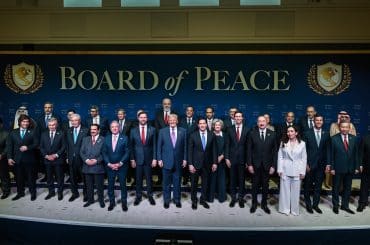The filmmakers behind Miral are finally preparing for its March 25th release and are now having to fight with the Motion Picture Association of America (MPAA) over a possible R rating. This would not only hurt the film’s commercial chances, but also keep it from one of its intended audiences – young people like the protagonist Miral.
The distributor of the film, The Weinstein Company, is appealing the ruling and director Julian Schnabel, producer Jon Kilick, screenwriter Rula Jebreal, and Weinstein Company co-chairman Harvey Weinstein have released a scathing statement about the MPAA and the political challenges they face getting it to a wider audience. It reads in part:
On Thursday Long Island Republican Rep. Peter King will launch Congressional hearings on American Muslims that are being widely derided as a witch-hunt worthy of Joe McCarthy. By his own admission Rep. King is working with anti-Muslim zealots like Brigitte Gabriel, founder of the hate group Act!, which has made millions of dollars espousing the most despicable, bigoted, and anti-American views about all Muslims in the US. At a time in which we have seen historic, non violent, democratic revolutions taking place across the heart of the Muslim world, it is ironic and sad that these people have been allowed to shape the national dialogue on issues that effect all of us as Americans, even as Julian Schnabel, one of America’s most celebrated artists and filmmakers, is being attacked for his sober and deeply emotional portrayal of these very same issues.
Indeed, Schnabel is in the middle of an appeal process with the MPAA because of the current R rating of his film, ‘Miral.’ The film has been made for the very young adults that need to see it the most; the people it’s being restricted from. This includes the author and screenwriter’s 14 year old daughter for whom the story is named. Let us be clear, we now have a situation in which a 16 year old can pick up the front page of the New York Times and read a profile of a hate monger like Brigitte Gabriel, who peddles lies and distortions for a living, but that same 16 year old cannot go to a neighborhood multiplex to see the true life story of another 16 year old woman who’s non violent struggle for dignity stands in stark contrast of the vile rhetoric about Muslims and Middle Easterners that has become so much a part of the mainstream dialogue in this country.
Schnabel reiterated much of this in a post on the Huffington Post as well:
The extraordinary revolution we’ve witnessed in places like Tunisia, Egypt and now Libya has awakened the optimist in all those who work for peace and freedom. This movement has happened, in large part, due to brave, educated young people taking control of their lives and embracing democracy in a deeply inspiring way. This is their moment in time. And their actions will lead to a positive transformation of a very volatile region.
As a filmmaker, I wanted to open a dialogue with young people in the U.S. about one complicated and often misunderstood part of the region — Israeli/Palestinian relations. Understanding this conflict requires not only historical perspective, but our ability to look beyond countless negative images and perceptions and one side usually portrayed as “the bad guy.”
Our film, based on Rula Jebreal’s novel, tells the story of Miral, a young Palestinian girl (played by Slumdog Millionaire’s Freida Pinto) who grows up in East Jerusalem against the backdrop of war and occupation. From the age of five, Miral is raised at Dar El-Tifel, Hind Husseini’s orphanage and school, where she is taught that education is the only way toward lasting peace. As she moves into young adulthood, Miral gradually awakens to her people’s struggle and ultimately must choose between a path of violence or a path of peace.
As a father of five, I made Miral for young people. The heart of this story is all about the lasting impact of education and the journey of a relatable main character, who tries on several different approaches to solve the problems in her life, including violence, but in the end, falls back on the ideals she learned as a child. This is, in my humble opinion, an exemplary message for our time, especially for young people — whether they live in Brooklyn, Jerusalem, or anywhere in between.
This is why I was shocked and saddened when the MPAA awarded Miral an “R” or restricted rating. As a filmmaker, I took great pains to tailor Miral to the intended audience and frame this material appropriately within the guidelines of a PG-13 rating. I made very clear aesthetic choices so we feel the impact but never see anything that could be construed as problematic or gratuitous. It was the first time where I was conscious of the MPAA during the filmmaking process, and steered clear of anything that might result in an “R” rating.
His piece ends: “It is our hope those who have great power to determine what is and what isn’t appropriate for young adults will look inside their hearts and realize that as young people fight for freedom in one part of the world, our sons and daughters here at home will be afforded the opportunity to learn more about who those people are.”

